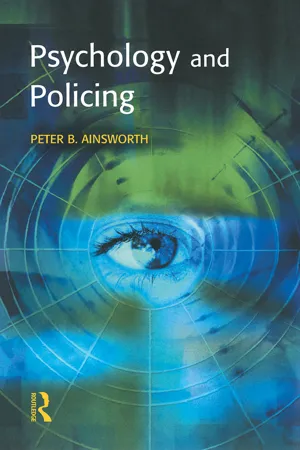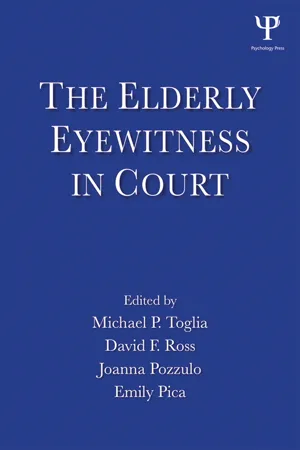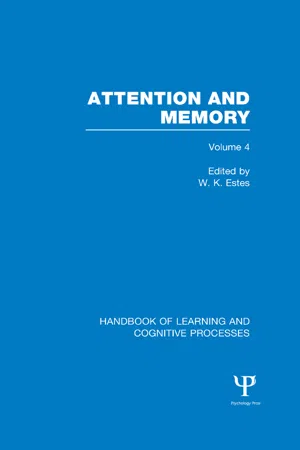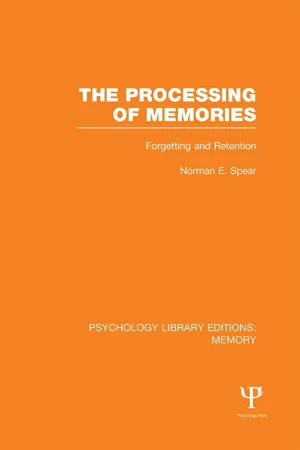Psychology
Factors Affecting the Accuracy of Memory
Factors affecting the accuracy of memory include the influence of emotions, the passage of time, and the impact of external information. Emotions can enhance or distort memory, while the accuracy of memories can diminish over time due to decay or interference. Additionally, exposure to misleading information can lead to memory distortion, impacting its accuracy.
Written by Perlego with AI-assistance
Related key terms
Related key terms
1 of 4
Related key terms
1 of 3
4 Key excerpts on "Factors Affecting the Accuracy of Memory"
- eBook - ePub
- Peter Ainsworth(Author)
- 2012(Publication Date)
- Willan(Publisher)
However, even taking these factors into account it is still not possible to predict with certainty which witnesses will be affected and which will not. Even the somewhat common sense viewpoint that confidence is linked with accuracy has rarely been supported by research (Loftus, 1979: 101). For this reason, some psychologists (e.g. Cutler and Penrod, 1995) have argued that courts should be made aware of the difficulties faced when trying to evaluate the likely accuracy of eyewitness testimony.We should note that, although the studies discussed above relate to memory for events, Loftus has demonstrated that memory for facial details can also be altered. For example in one study (Loftus and Greene, 1980) participants were instructed to look at a face and then some time later to try to recall details of the face. However, in the intervening period, some subjects were given misleading information about some aspect of the face (e.g. that the hair was curly when it was in fact straight). In this case, those who had been given the misleading information were significantly more likely to be incorrect in their recall of the original feature.Factors that might affect witnesses at the time of recallIn the sections above we have suggested that memories can be affected both at the time that information is taken in and while the memory is in storage. Research also suggests that there are factors that will affect witnesses at the time that they are asked to recall details of the incident. We will be dealing with the recovery of memories in some detail in the next chapter, but it is important that we are aware of some of the variables that can affect recall at this stage.One obvious factor is anxiety. If a witness is particularly nervous they may find it difficult both to take in and to recall information accurately. For most victims and witnesses, giving evidence in court will be a stressful experience. Not only might they be recalling information about a particularly harrowing ordeal, they will also find themselves in an alien environment where the ‘rules’ are very different from anything they might have experienced previously. Courts rarely take steps to make a witness’s ordeal less traumatic and, as a result, recall may suffer. There is some evidence to suggest that stress can interfere with recall when a witness is attending an identification parade (Ainsworth and King, 1988). It seems reasonable to presume that the levels of stress experienced when giving testimony may be even greater. - eBook - ePub
- Michael P. Toglia, David F. Ross, Joanna Pozzulo, Emily Pica(Authors)
- 2014(Publication Date)
- Psychology Press(Publisher)
after the event has occurred. We highlight two examples of perpetuating factors: source memory as an example of a biological factor that affects the retrieval of information and postevent misleading information as an example of a social factor. As mentioned earlier, age differences in source monitoring failures have been found for a variety of memory-related tasks (e.g., Rulz-Gallego-Largo, Simón, & Suengas, 2012). A decline in memory for source has been shown to diminish the accuracy of elderly witnesses (e.g., Cohen & Faulkner, 1989) and can lead to greater susceptibility to misinformation compared with younger adults (e.g., Mitchell et al., 2003). For example, Aizpurua, García-Bajos, and Migueles (2011) found that elderly adults (56–75 years) compared with younger adults (18–33 years) were less able to attribute actions that occurred during a robbery to their correct sources; Aizpurua et al. argued that source memory deficits may contribute to elderly adults’ false memories in real-life eyewitness situations.In terms of perpetuating social factors, there are a number of factors that may influence elderly adults’ retrieval and retention of experiences, such as the degree of delay between the target event and event questioning (e.g., Wheeler, 2000), the type of test used (e.g., recall vs. recognition; Cabeza et al., 1997), and the type of question asked. For example, in terms of the latter, elderly adults are less accurate than younger adults in response to direct- and cross-examination questions (e.g., Brimacombe, Jung, Garrioch, & Allison, 2003). The influence of exposure to misleading postevent information on elderly adults’ recall has received considerable research attention. Numerous studies have revealed that elderly adults are more susceptible to misinformation than younger adults and report more confidence in their false and misinformed reports (e.g., Mitchell et al., 2003; Roediger & Geraci, 2007). Stress also appears to increase elderly adults’ susceptibility to misinformation (Misirlisoy, 2007). However, a handful of studies have also reported no significant differences between younger and elderly adults regarding susceptibility to misinformation (e.g., Dodson & Krueger, 2006), possibly due to various factors like differences in memory strength of the witnessed event prior to exposure to misleading information. There have also been a couple of studies on the impact that negative feedback has on memory reports. For example, McMurtrie, Baxter, Obonsawin, and Hunter (2012) examined the effect of negative feedback within a simulated forensic interview about a mock crime with young (ages 18–35 years), middle-aged (ages 36–64 years) and elderly (ages 65–82 years) adults. Interestingly, elderly adults showed reduced susceptibility to interrogative pressure compared with younger adults. Similarly, Polczyk et al. (2004) found age differences favoring younger adults (ages 18–35 years) compared with older adults (ages 49–88 years) on the yield score (the number of accepted suggestions) of the Gudjonsson Suggestibility Scale (Gudjonsson, 1987) but no age differences with the shift - eBook - ePub
Handbook of Learning and Cognitive Processes (Volume 4)
Attention and Memory
- William Estes(Author)
- 2014(Publication Date)
- Psychology Press(Publisher)
Rather than try to untangle the many experimental findings that indicate one or another effect of cuing, it seems sufficient to remark that the mechanisms described above probably operate in varying combinations. In conjunction with other manipulations, cuing might affect processing at several loci in the memory system. In the context of this section, it is important to note that cuing may be viewed as introducing temporal variables whose effects become confounded with organizational factors manipulated by the experimenter. Because of the many complexities involved in experiments using cues, extreme caution should be exercised in interpreting their results. Too often, results from such experiments are cited as evidence for a particular thesis when a more careful analysis indicates that any number of factors may be producing the effects.V. CONCLUDING REMARKS
We began this chapter by describing an idea currently popular in cognitive psychology: there is a “pure” component of the memory system, referred to here as fact retrieval, which serves as a substrate for higher-order processes requiring information stored in memory. Relying on certain intuitive ideas, we considered how fact retrieval could be experimentally isolated from aspects of remembering that involve inference and problem solving. This discussion was intended to demonstrate why the methodology and paradigm developed by Sternberg (1966, 1969a, 1969b) have been widely used to investigate fact retrieval.Subsequently, we described some of the theoretical constructs adopted in models of fact retrieval and illustrated the types of results cited to argue for their validity. We especially stressed the idea of directed and non-directed search processes and the experimental procedures designed to discover their respective roles in fact retrieval.Finally, we presented a more detailed evaluation of how temporal variables (for example, manipulations of recency and frequency information) influence fact retrieval. Rather than summarize this discussion, we want to mention briefly its relevance to the prior sections. It seems clear that temporal variables can be a major determinant of performance in tasks intended to study fact retrieval; they provide a basis for alternative inferential mechanisms to play a role in responding to certain types of probes, increasing the difficulty of using behavioral data to infer the nature of fact retrieval processes per se. In addition, experiments designed to investigate the effects of perceptual and semantic organizations on fact retrieval often confound these factors with temporal variables, so that the models proposed for these effects may reflect incorrect assumptions about memory structure and processing. - eBook - ePub
The Processing of Memories (PLE: Memory)
Forgetting and Retention
- Norman E. Spear(Author)
- 2014(Publication Date)
- Psychology Press(Publisher)
with the specific exclusion of the features that are required to define evidence of memory acquisition (original learning) . In experimental tests of memory, this would exclude, for example, the specific stimulus for a response in a paired-associate task, the specific conditioned stimulus (CS) for classical conditioning, or the discriminative stimulus in instrumental conditioning. Where a discrimination is involved, both the CS+ and CS−, or correct and incorrect stimuli (S+ and S−), would be excluded. Except for the response used as the index of learning, all other events noticed by an organism would be contextual stimuli, including the proprioceptive stimuli that are consequences of the response. Of special importance here is the fact that a contextual cue has latent capacity for retrieval.Contemporary context and prior cueing to influence memory retrieval. Differences between the context accompanying acquisition of the memory and the context present when retrieval of the memory is required may cause forgetting. For a variety of reasons, such differences become more likely as the interval between acquisition and retrieval of a memory lengthens:1. Sensory consequences of training dissipate (rapidly), neurochemical and hormonal consequences dissipate (somewhat more slowly), and in certain cases internal homeostatic responses to these two physiological effects may add to the stimulus change.2. The internal environment also changes on the basis of preprogrammed factors that may be progressive (e.g., aging) or cyclical (e.g., estrous).3. The external environment changes because of either rhythmic (e.g., daily or seasonal) or irregular (e.g., the weather) factors.4. New memories may be acquired that, though different in certain critical respects, may have attributes in common with the memory to be retrieved and so may compete (interfere) at the time of retrieval.5. Idiosyncratic responses that preceded acquisition of the memory, including some caused by the preceding factors, may be less likely to recur prior to the occasion of memory retrieval.Such changes in context may produce forgetting for either of two general reasons. First, a sufficient number, or the proper kind, of memory attributes may fail to be activated because of the absence during testing of stimuli that were present during learning. Second, through notice of stimuli during the retention test that were not present during learning, attributes of conflicting memories may be aroused: Retrieval of a conflicting memory may interfere with retrieval of the critical memory through competition.
Index pages curate the most relevant extracts from our library of academic textbooks. They’ve been created using an in-house natural language model (NLM), each adding context and meaning to key research topics.
Explore more topic indexes
Explore more topic indexes
1 of 6
Explore more topic indexes
1 of 4



